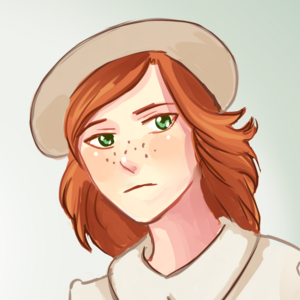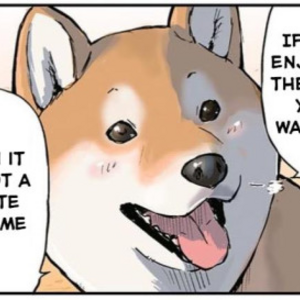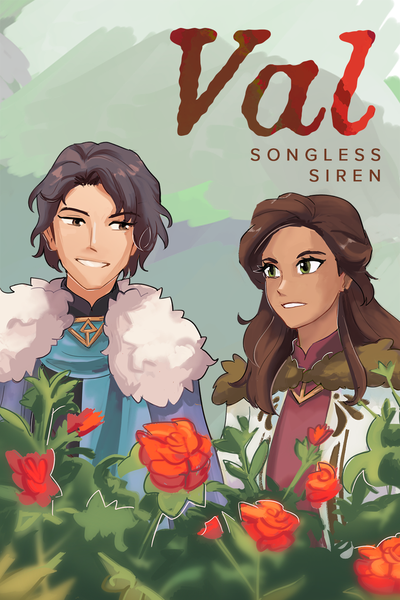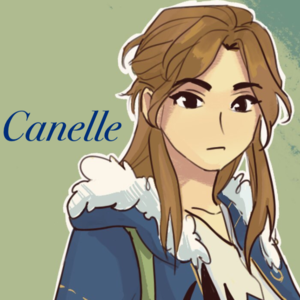"I lied to her. Because I lie. It’s what I do.”
In the present, Valkom sat across from his traveling companion, Canelle.
They waited for their breakfast in the saloon of the riverboat earlier than Canelle would’ve liked. Her first night of travel had been too guilt ridden for good sleep. When she first sat down at the table, the man pointed out her exhaustion, as if his own eyes didn’t reflect a similar story.
As part of his ruse, he pretended he was unbothered by their reality at first. And while Canelle is the sort to prod, she wasn’t in a position she felt comfortable doing so yet. He may be running around as a ‘commoner’, but she is the real commoner here, with absolutely no right to press him on matters she had little business getting involved in.
With zero prompting, he plopped an orange leather-bound journal on the table. It was worn, its pages tinted yellow feathered on the edges on the top half of the pages. Its bloated, curved cover tied close with a thinner strand of leather that had long-lost its color.
“Is this yours?” Canelle asked, assuming she was looking at a journal. She had a similar one of her own to document her travels, but this one looked better traveled. She was new to adventuring.
His mouth thinned and shook his head. “Nikase’s.”
Canelle’s eyes widened, her jaw dropping. “D-did you…”
“No. She gave it to me, when I saw her last.”
“Oh…”
“Why?”
“Why—? If you don’t know, I definitely don’t know.” Canelle likely knew a different Nikase than Valkom. She was a kind, reserved, classy woman with a complicated past. She was intelligent, yet she chose to love Valkom of all people—
No. Those were Canelle’s previous biases coming through. People don’t choose who they fall in love with. She of all people knew that to be true.
“Do you think it’s a test?” he asked.
“What kind of test? Did she forbid you from reading it? I assumed she gave it to you to read.”
“She did want me to read it. I’ve read some it… I don’t know if I can continue.” He was hovering over what he actually wanted to talk about. Canelle was about to point that out when he continued, “She ended things shortly before we left Gaidos.”
“She—” The young woman expressed sincere alarm. “I thought—Things were going really well?”
“Well, as well as they could be given the circumstances.”
The circumstances.
He went on, “That’s just it, though. When we went our separate ways, she acted as if we would see one another again. As if there were to be a ‘tomorrow’—many tomorrows—for us.” He set his squared palm on the journal. “Then I found this in the bags she packed for me, with a note. It was a peculiar, that she would want me to read this. There was no reason for me to. I trust—” He cleared his throat. “I think it’s because I lied to her that day.”
He delved into his history with Lady Nikase, from how they met to his supposed lie. Canelle felt that he wanted to put it out there, in words, to ease his anxiety, and it didn’t matter who it was he was speaking to or if they were listening. But she listened because she did care.
“I never feared not ever knowing love—because you have to love life to fear—rather it is something I dread. That the thing I would love has yet to exist and won’t exist, in the near future or ever.” He grinned at her, sensing that she wanted to interrupt, and why that was, so he walked the statement back. “Alright, I have had love before, and I make a point of keeping it within arm’s reach.”
“You’re talking about Lior?”
He nodded, “The caveat about my loves is that they are natural loves. When you are fruit hanging on the same vein, facing the same storms, the same heat, and drinking the same groundwater, relationships ferment into a consolidated, robust, love. But I want what those around me have: Something beyond rationality, that I would struggle to put into words.”
A waiter approached them and offered the two travelers wine for their empty glasses.
Valkom put his hand over his glass, “No, not for me.”
First love
“I’ll let you be king the day you beat me at this game.”
At that age, 7, I was completely sold on the idea that being king was something I wanted. That it was something everyone wanted, and that it was a task only ever bestowed to the ‘right’ person.
So when my father said those words to me, I was determined to beat him at the card game.
How great, how hilarious would it be if I, Valkom Arte Mios, bested my father at the game and became king at the youthful age of 7. If not 7, absolutely certain by age 10. Valkom Mios, Boy King.
He hadn’t meant the remark, that was obvious to everyone except myself. It was offhanded, he would forget it the second he stepped out of the room.
My mother held her laughter when I reiterated this to her later. To laugh at others' expense was against her beliefs, and while I’m the first to agree that my character is lacking in morals, I align myself with that belief.
Miomia, a shared delight, is what her name meant in her native tongue. She was from Idon, and my father married her for reasons that would require me to share my comments on the soft infrastructure of our country, and I’ve been told repeatedly by my father and Lior to keep those to myself.
The name was fitting of her radiance. A woman who never sat still, felt the need to keep moving, much to the chagrin of her husband.
Liorit is often slandered for her unladylike behavior at Court, and I have no problem with it. This very well stems from how my mother was. She did as she liked, so I have no foundation for how a ‘lady’ ought to be. My mother was a great mother though, so clearly how one chooses to live their life, ladylike or not, doesn’t affect that.
Speaking of Liorit…
“You know Val, Lord Saëns is the only person I’ve ever seen beat your father at Little Weapon. You could ask him for some pointers,” said my mother.
Little Weapon being the name of the card game, and Lord Saëns being Lior’s father. But I was caught up on another thought:
“Then why isn’t he king?” I asked dumbly.
She laughed, again not at me, rather because she thought I made a joke.
My question was real however. In my preconceived notions, I’d assumed my father was beyond mortal. That if he didn’t know everything, he knew the most. That he was King by the will of a higher power, one that knew my father’s judgment was one to be trusted. In a perfect world, these things would be vetted, not postulated as infallible.
Second love
When I spoke to Lord Saëns about playing cards, he referred me to his daughter. I argued a case against it, but he countered that he would play with me if I could win a game against Liorit.
I’d known her at this point, our mothers were friends, and it was never a secret that they planned for us to marry. While she wasn’t a princess of a country we needed to enter an alliance with, her mother was from a long-established, powerful Idon family. Not only did they have money beyond that of the crown (during a time we really needed it), but their invention of the printing press led to their controlling several major newspapers across various nations.
And when you control the press, you control the narrative.
Even in youth, that was a frightening notion.
Lior, in contrast to her family’s history, was very approachable. And the way she spoke to me said more than her words did. She was without a doubt smarter, yet she didn’t infantilize me like others.
Because of this, I allowed our friendship to blossom. A true rarity, it would be a couple of years before I would call her my best friend.
Like all things that shape us, there was an incident behind my decision.
We snuck out of Lior’s house often to explore the town of Zapide. When our fathers found out, they were vehement that our behavior ought to be ‘corrected’.
The church sponsored behavior ‘correctional camp’ we were sent to was the one they sent the kids of noblemen, and it was obvious from the start that they treated us better than the other kids. Yet we teetered on the fence, because we were that infuriating to the Dean of Students.
Alright, I teetered on the fence. Lior was included by association.
She was easy to convince. Nothing we did as kids was against her will. She knew the rules through and through, and because of that, she was quick to disobey rules on a technicality, loopholes the adults would have a hard time walking back afterward. If we got in trouble for sneaking out, it was because her father instructed her to keep an eye on me. If we tracked mud into the house after playing in the river, we were concerned for our safety and practiced disguising ourselves with our surroundings. If we lost our pets, we did it intentionally, returning order to nature.
At the camp, we were only allowed to visit home every other weekend. For this, they had the kids split into AB schedules. It was easy to convince our driver that the schedule reset after the holiday break and so on that A (but actually B) week Lior and I snuck into town easily.
Before we could visit all our favorite spots, we needed money, and since the camp was to provide everything we needed (and because we were shit children), our access to allowances was temporarily on hold. Fortunately, Lior and I knew a workaround in the form of playing marbles with other kids under a market staircase.
It was there the situation arose. One offhanded remark I said under my breath. Thoughtless. An expression I’d heard older adults use in frustration, without knowing its origin or the history of the people it regarded.
The Ruda were a semi-nomadic colony Bevij and the other northern countries had a half-hearted peace agreement with. It only worked because Idon refused to trade with anyone who didn’t honor it, and they were the richest country on their half of the continent. Every couple years or so, one of the smaller countries would forget and throw a tantrum, which Idon would promptly slap down with another political marriage.
All efforts towards peace were thwarted by a history of religion fueled violence on both sides. All that remained now was a stale, hideous, war of words and disdain.
I lost the game of marbles against my opponent and uttered the slur in defeat.
The boy across from me was older and taller, he blinked his dark green eyes in surprise, his thick brows knit together.
“What did you call me, asshole?” he said, rising to his feet. His ears and cheeks flushed a deep crimson, and his fists curled at his sides.
I, in a crouch with my hands on my knees, remained fixated on the results of the game. He won the game, there was no reason for him to be upset. Looking up at the boy, he wasn’t a bully-type either, nor one to be quick to anger. He was visibly distressed, and I couldn’t put together why.
Lior, always quicker than myself, had already turned away from her game and begun to de-escalate. On her feet, she only came up to his nose in height.
“My brother didn’t mean that. I don’t know where he heard–”
“I wasn’t referring to you, I was upset at myself–” I stood up, trying to clear up the misunderstanding before we drew unwanted attention to ourselves. Our gray uniform hooded cloaks were in retrospect awful disguises.
“You shouldn’t use that word regardless,” Lior said to me, a little irritated. Very Idon of her.
“It obviously wasn’t towards him, he’s not Rudian.”
“You don’t know that,” she warned.
“He doesn’t look like one–”
The boy’s fist met my cheekbone with a loud pop. I was back on the floor, my head reeling from the shock.
Lior’s opponent – his attention drawn from their game of marbles – started chanting ‘fight’ eagerly, and the other kids jumped in with little context.
But the young man had no desire to continue, he had silenced me and that had been his intention in hitting me.
“Artie, we gotta go.” Lior said, pulling her hood up and helping me up.
I fumbled to put my own up, and backed away from my attacker with caution.
“What’s going on here?” A deep voice rang.
Lior swore at the sight of the city guard jogging over. A number of the kids scattered like ants, but a few curious ones lingered. The boy I offended stood there awkwardly, shifting his weight from ankle to ankle, undecided if he should run.
The chances of the guard recognizing us were slim in the part of the city we were in. That was a concern Lior had and I could tell from her body language. He must’ve known her father because he recognized her first, hood and all.
“Little Liorit? Liorit Saëns? What are you doing here?” He looked back and forth from her and my attacker, before setting his eyes on me. “Your Highness Prince Valkom? What happened to your face?”
He dropped onto his knee to examine my swelling cheek. Behind him, I watched the boy’s color drain from his face, as the names clicked in his head. A part of me wanted to give him assurance, tell him that we were likely in more trouble than he. Although… Lior would later make me doubt that.
My staring at the boy drew the guard’s attention to him. He turned back to look at the young boy, and with a loud demanding tone shouted, “Did you do this?”
“I did, Sir Henri.” Lior interjected to everyone’s disbelief. When she realized that no one was buying her admission, she tacked on an amendment to her statement, “He said I couldn’t play because I was a girl, so I punched him.”
Once again, Sir Henri gave the three of us a good long look, one by one, hoping we would crack under his daunting gaze.
“I’m sorry Liorit, I’m having a hard time believing that someone of your small stature should hit hard enough to leave a mark like this.” He said.
The girl, without hesitation, planted her fist into his cheek. My jaw dropped, and it took the work of all my face muscles to withhold my laughter.
Sir Henri, still holding the majority of his weight on the one knee, almost toppled over.
“Liorit!” he exclaimed. “ What has gotten into you?”
“I’m tired of being underestimated because I’m a girl.” She explained flatly.
“She did just say that.” I noted.
His frown deepened, his nose scrunching up in distaste. We were wasting time on something trivial.
“Very well, come with me, both of you. We’ll go see your father, Liorit.”
“Why did you lie to Sir Henri?” I asked her in the carriage.
“He was Rudian and the city guard has a history of bias towards the descendants of the Ruda.” She said with a shrug. “The consequences for him would’ve been greater. Even if I’m reaching a bit, I’ll take a slap on the wrist over potentially ruining his life. Besides, you instigated.”
“Unintentionally.”
“Intention means most to those close to you. The further away you are from something, the less you care about its intention.” She pressed her lips together, “I know you didn’t mean what you said, Valkom, but don’t say it again.”
“Oh, I didn’t plan to.” I’d learnt my lesson. “Thank you, I owe you.”
She held up her bruised knuckles, “You totally owe me.”
“I can’t believe you punched him.”
We laughed together with an energy I long for in the mornings, when I open my eyes and the weight of our futures sits on my chest. Lior was true, Lior would never lie to me to spare my pride.












Comments (4)
See all